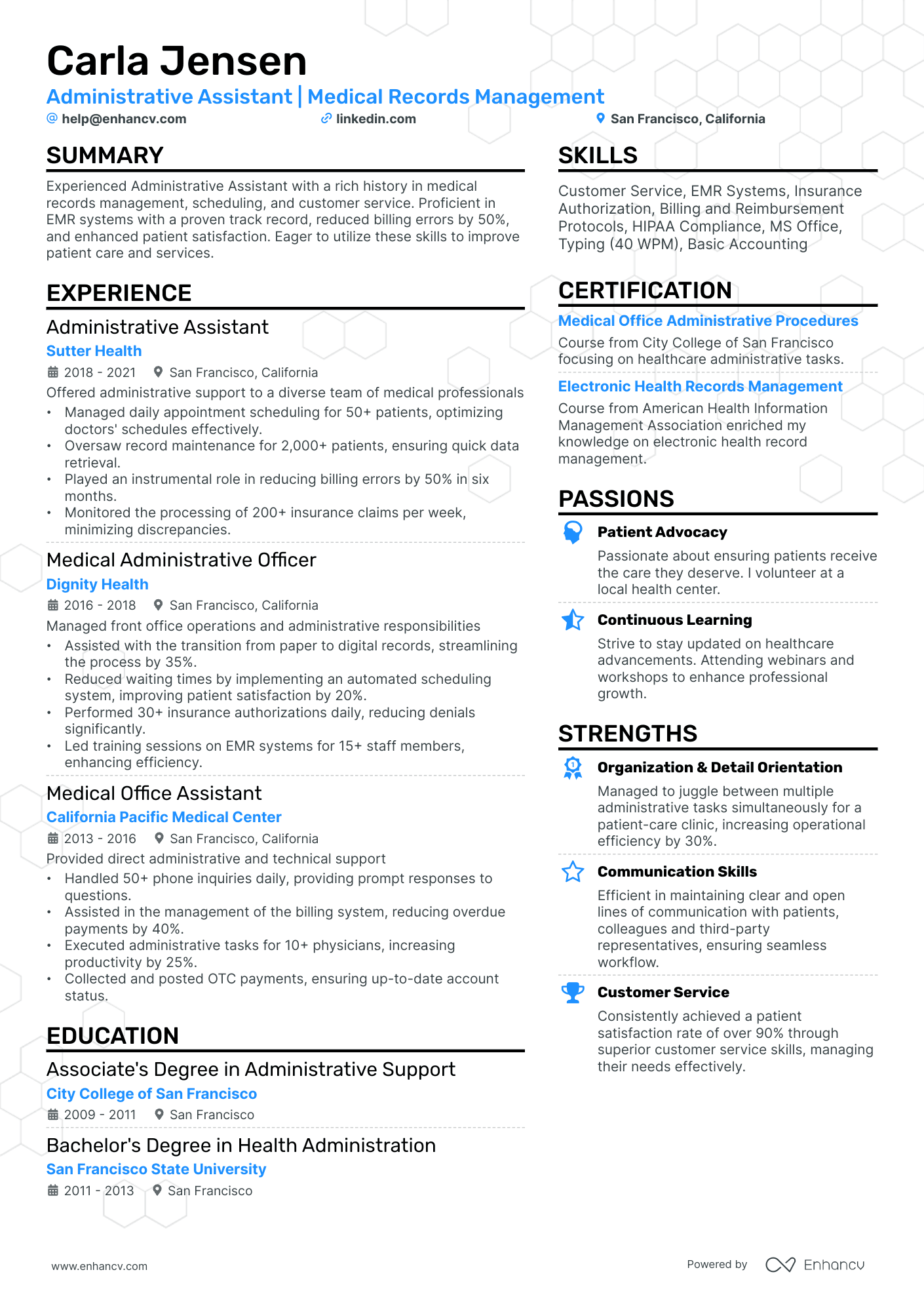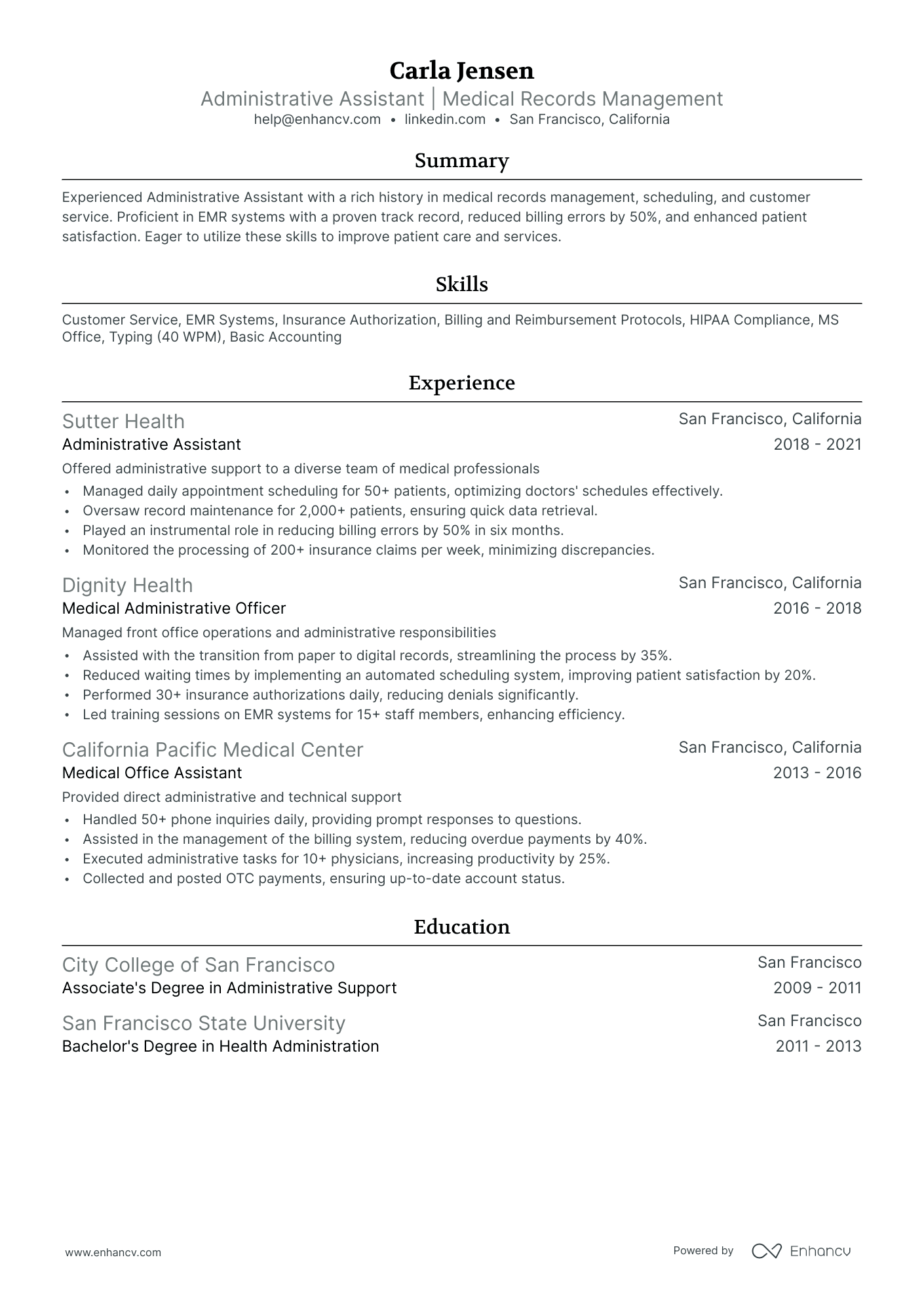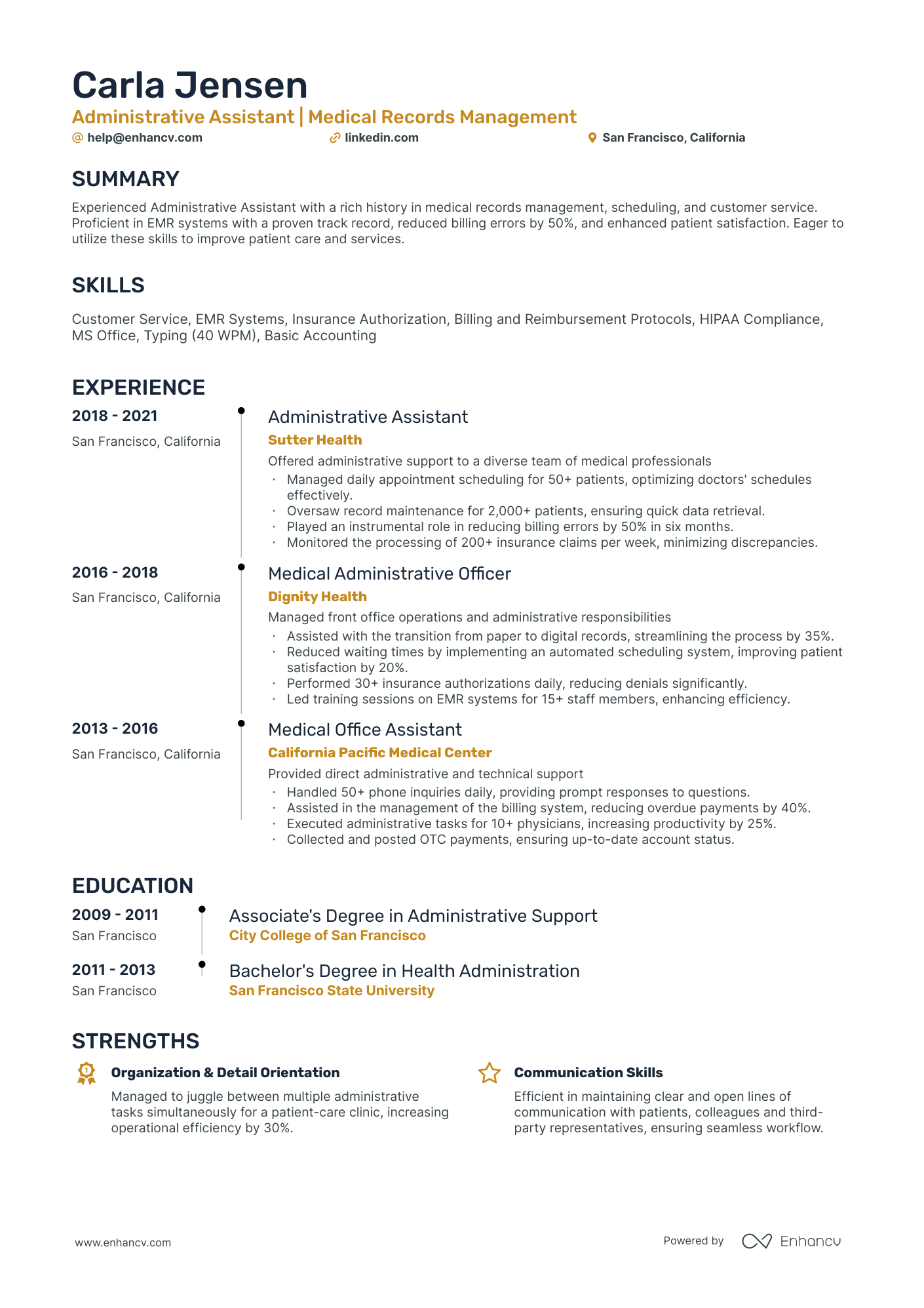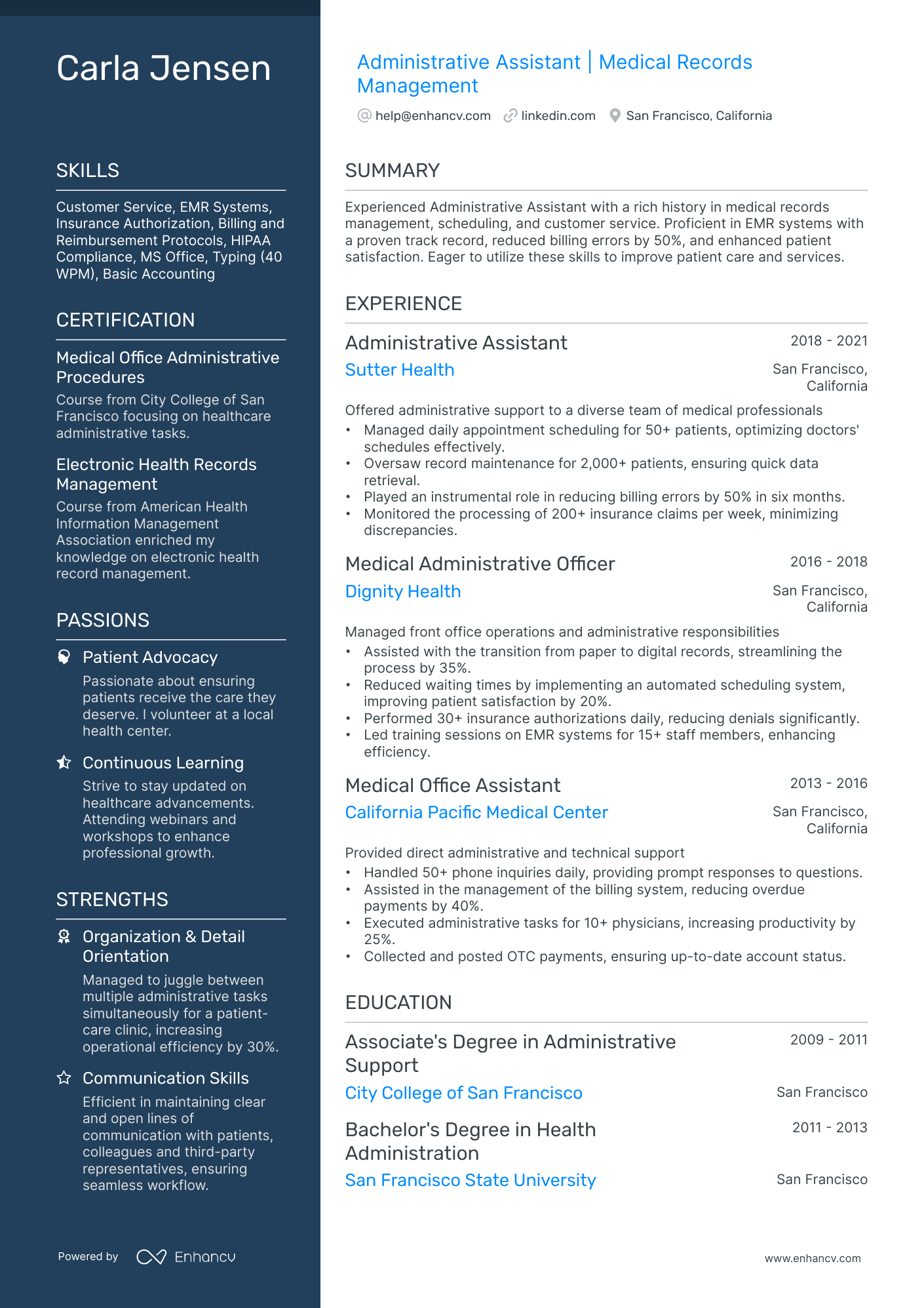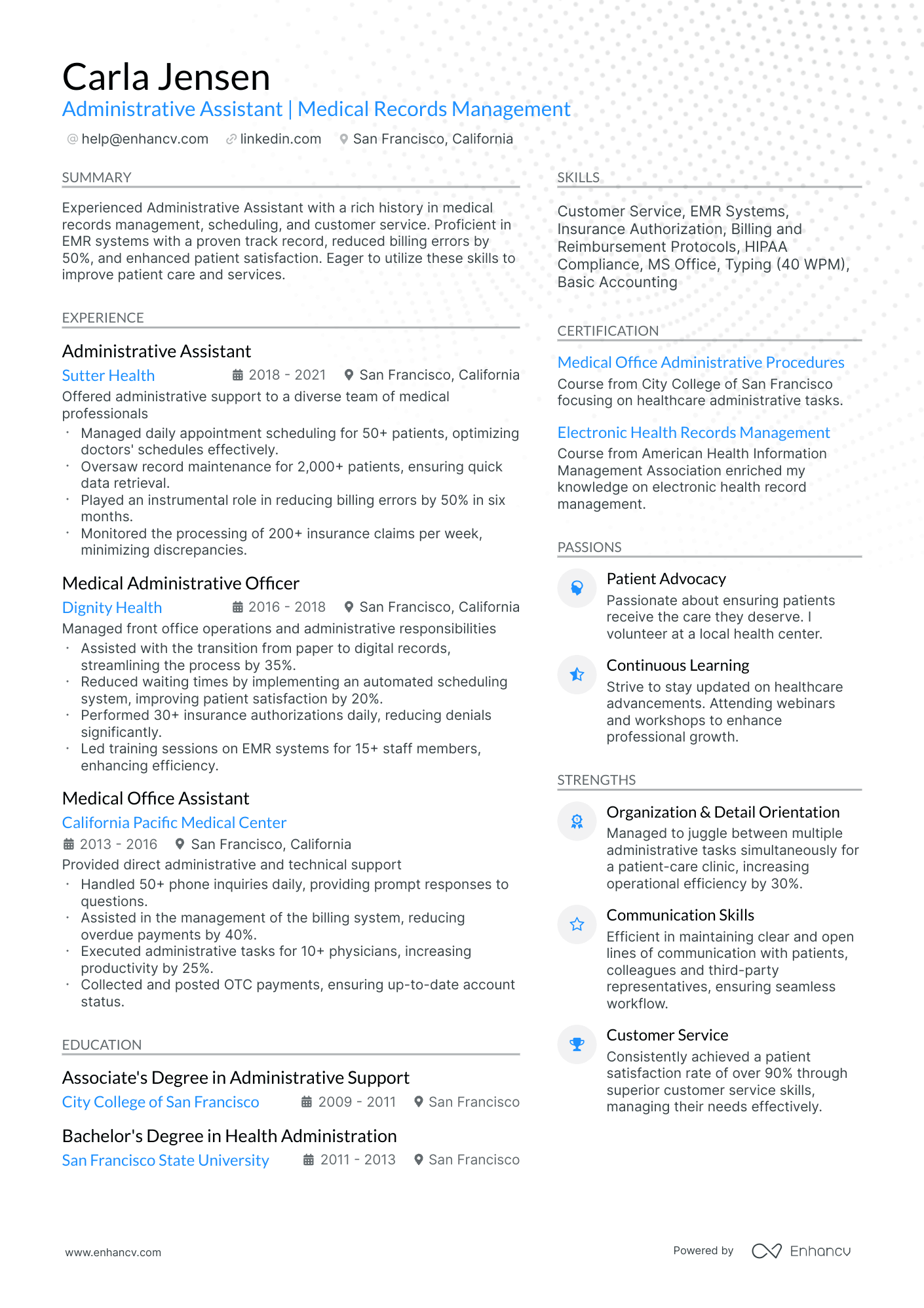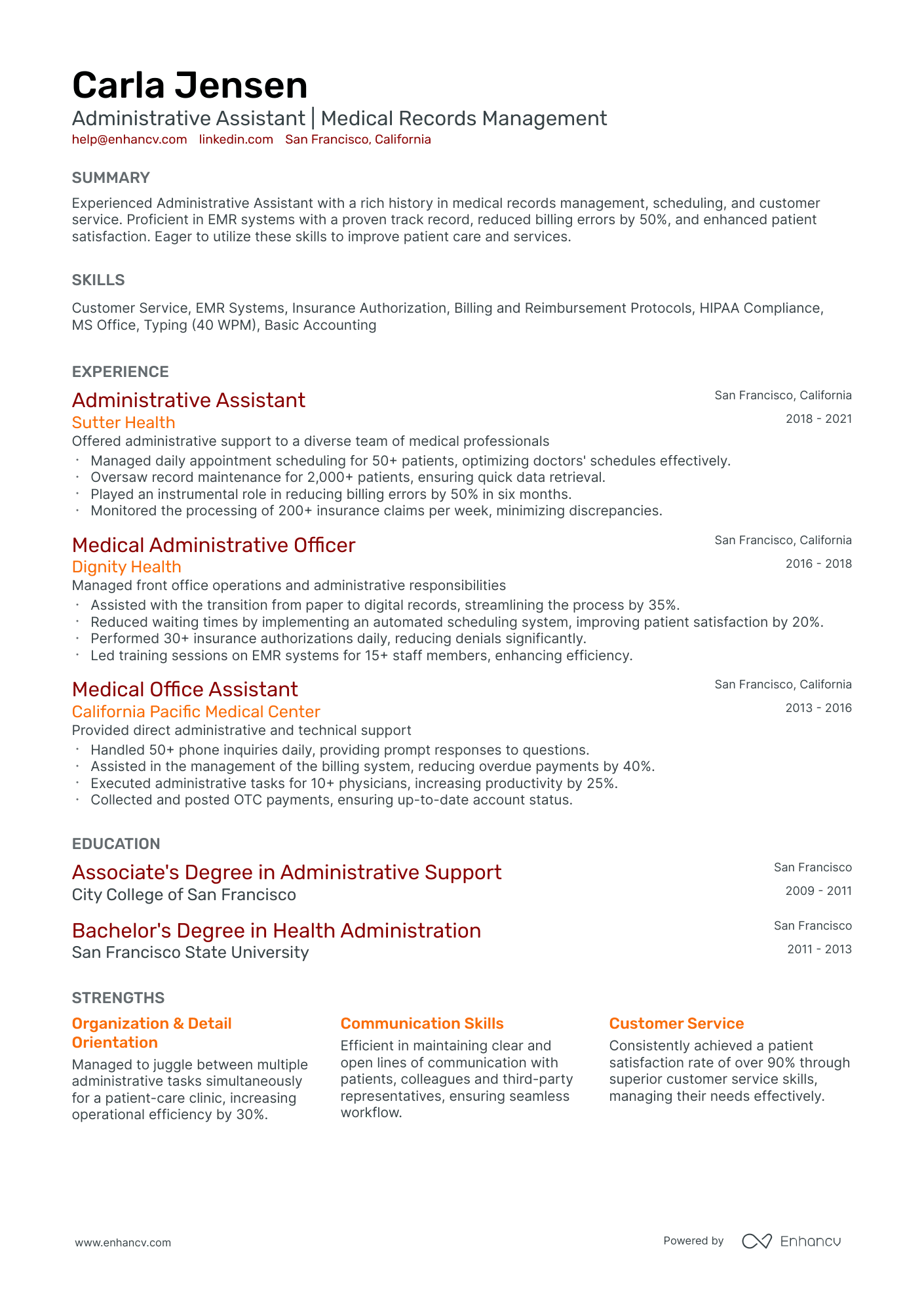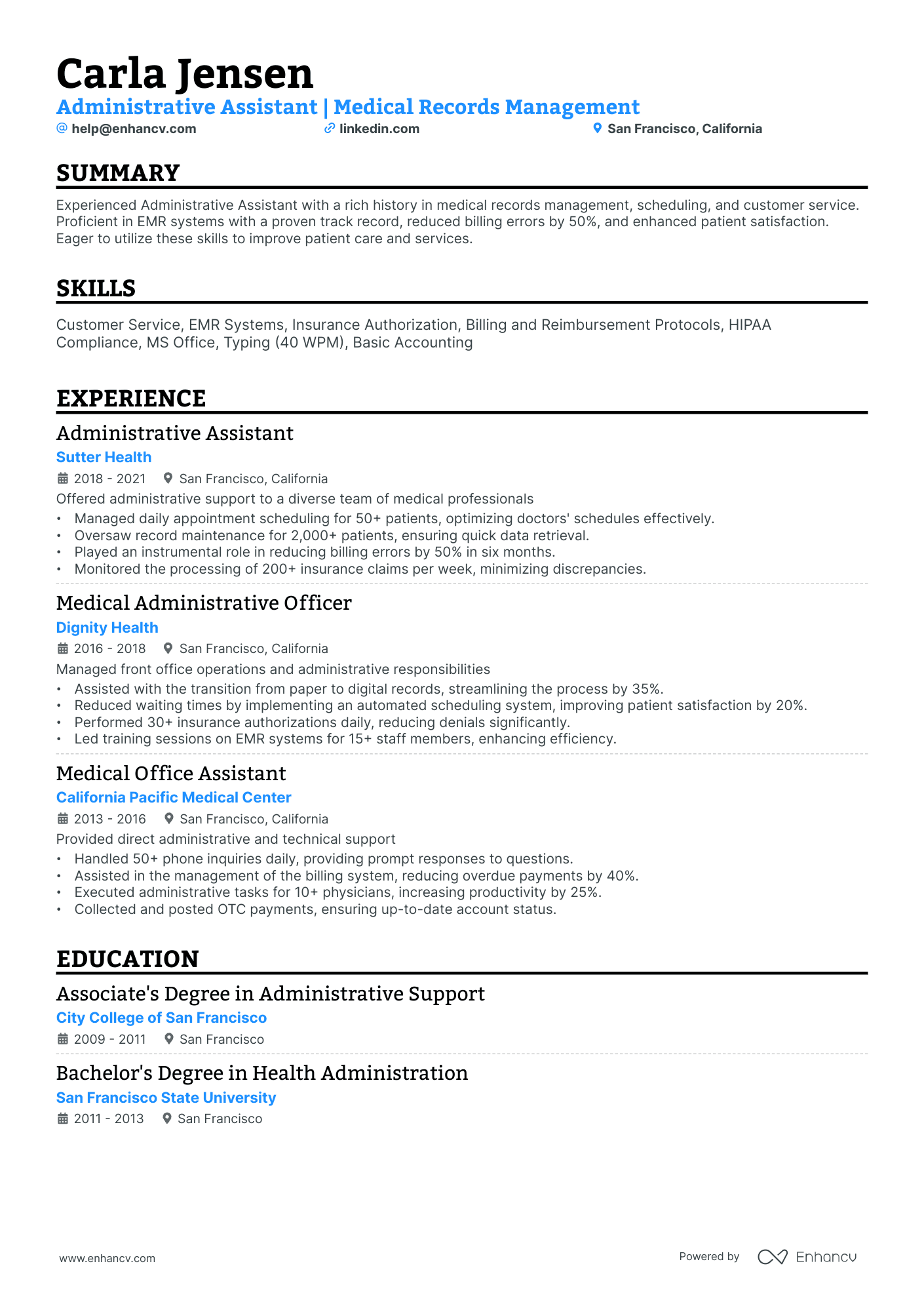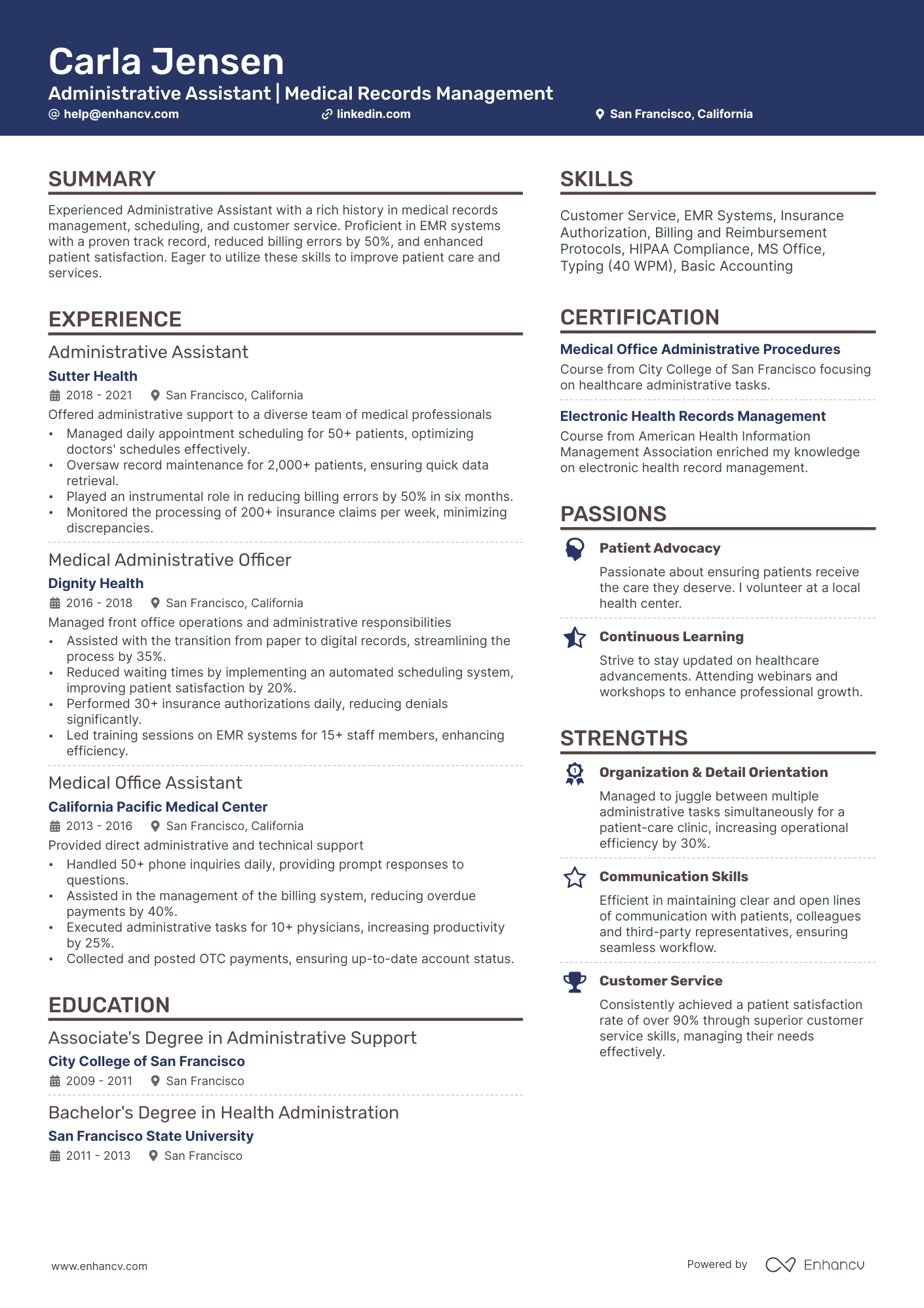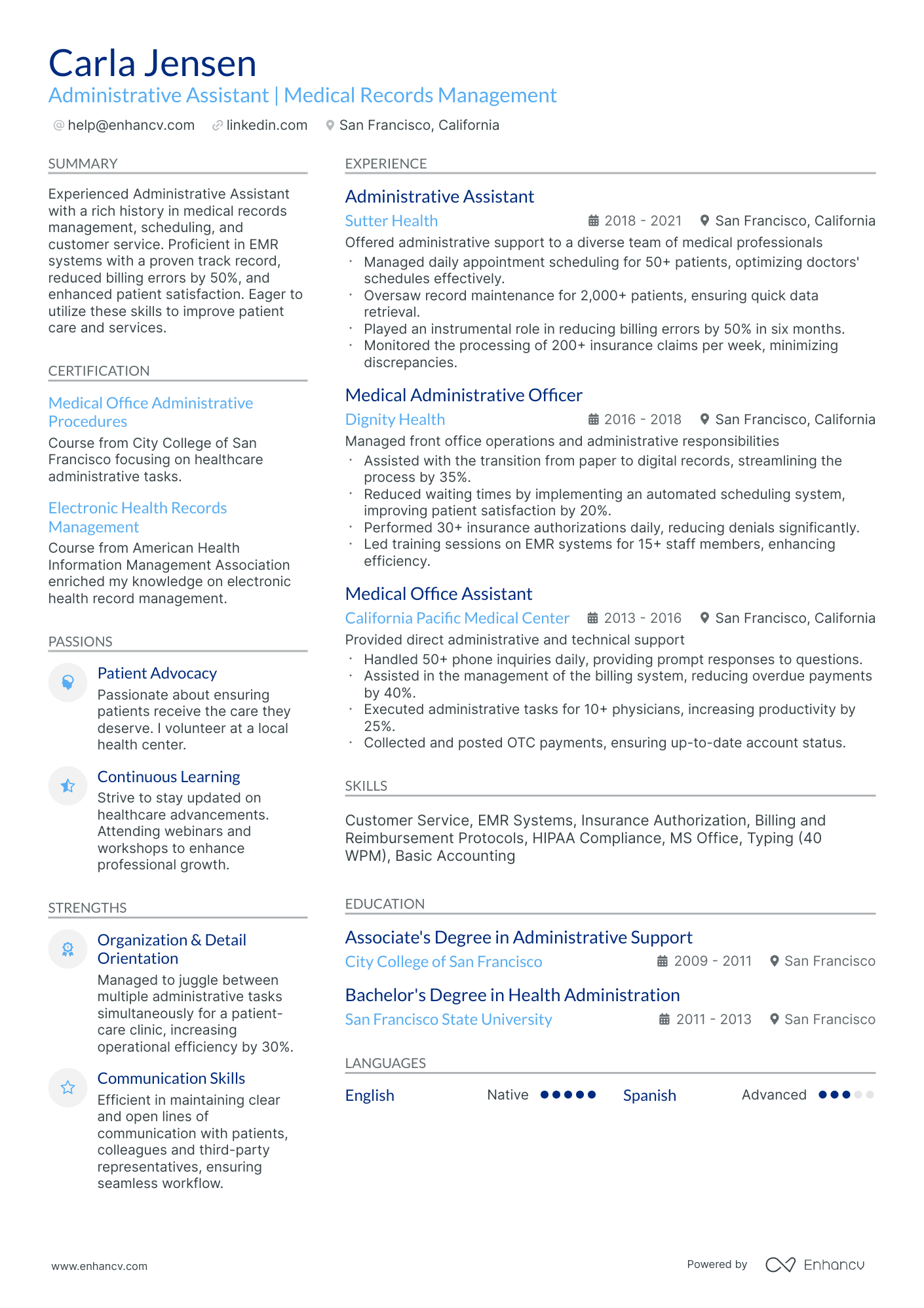Medical office administrators often struggle to effectively communicate their diverse skill set, which includes patient reception, data management, and insurance processing, in a concise and impactful manner on their resumes. Our comprehensive guide can assist by providing targeted examples and templates that help articulate these complex duties more clearly, thus helping potential employers recognize their unique qualifications and experiences.
Enhance your application for the medical office administrator role with our concise guide on how to:
- Format your medical office administrator resume, ensuring a balance between professionalism and creativity, in line with best practices.
- Align your resume with the medical office administrator job requirements by incorporating relevant industry keywords.
- Utilize distinct resume sections to highlight your skills and achievements, making a case for why you're the top pick for the medical office administrator role.
- Draw from leading medical office administrator resume examples to effectively tailor your experience.
Recommended reads:
Deciphering the best format for your medical office administrator resume
To craft an impactful medical office administrator resume, start by thoroughly analyzing the job description.
Your chosen resume format should seamlessly align your experience with the role's requirements.
Consider these four pivotal elements:
- Present your experience effectively. If you boast a wealth of pertinent experience, employ the reverse-chronological resume format, listing roles by date, beginning with the most recent.
- Maintain brevity. Limit your resume to a maximum of two pages, focusing on your most salient attributes.
- Headers serve a purpose. A well-crafted header ensures recruiters can swiftly access your contact details and professional portfolio.
- Opt for PDF. Typically, submit your medical office administrator resume in PDF to preserve its layout. However, always adhere to specific job application guidelines.
Tailor your resume format to the job market – a Canadian resume, for example, might differ in layout.
Upload your resume
Drop your resume here or choose a file. PDF & DOCX only. Max 2MB file size.
Pro tip
Choose a legible, professional font for your medical office administrator resume, such as Arial or Calibri.
Elevate your medical office assistant resume with these essential sections:
- Header: The go-to section for recruiters seeking your contact details, portfolio, or current role.
- Summary or objective: A snapshot of your achievements and aspirations.
- Experience: A testament to your technical and interpersonal prowess.
- Skills: A showcase of your capabilities aligned with the job requirements.
- Certifications/Education: A reflection of your commitment to staying updated in the industry.
What recruiters want to see on your resume:
- Proficiency in medical terminology: A clear understanding of medical terms is vital for accurate communication and efficient operation.
- Experience with electronic medical records (EMR): Familiarity with EMR systems such as Epic or Cerner is a critical component in modern healthcare administration.
- Skills in office administration: This includes scheduling appointments, patient registration, billing and coding, maintaining patient records, and other clerical tasks.
- Customer service expertise: The ability to interact professionally and empathetically with patients, their families, and other healthcare providers is paramount.
- Certifications related to medical office administration: These could include Certified Medical Administrative Assistant (CMAA) or Certified Medical Office Manager (CMOM), demonstrating a commitment to the profession and relevant knowledge.
Recommended reads:
Detailing your relevant experience on your medical office administrator resume
Showcase your credibility in the resume experience section. For an effective medical office administrator resume:
- Highlight measurable achievements.
- Scan the job advert for keywords and integrate them throughout your experience section.
- Emphasize your technical proficiencies and how you've applied them in various roles.
- Keep it simple: mention your responsibility, relevant skills, and the outcomes.
- Use this section to convey your unique value, soft skills, feedback received, and the type of company culture you thrive in.
Top professionals ensure their experience section offers a captivating look at their expertise. Check out our sample medical office administrator resumes for guidance.
- Managed patient records, maintaining accuracy and confidentiality for a busy medical office of XYZ Healthcare.
- Coordinated appointments and scheduled surgeries resulting in improved patient satisfaction and reduced wait times.
- Implemented electronic health record system, streamlining data management and reducing paper waste by 50%.
- Assisted physicians with billing and coding tasks, ensuring accurate reimbursement and maximizing revenue.
- Led training sessions for new staff members on medical office procedures and software usage.
- Maintained efficient front desk operations at ABC Medical Center, greeting patients and managing inquiries.
- Collaborated with insurance companies to verify coverage and process claims resulting in a 20% decrease in claim rejections.
- Developed and implemented an inventory management system for medical supplies, reducing stock shortages by 30%.
- Managed patient scheduling and optimized appointment slots, increasing daily patient capacity by 15%.
- Assisted in organizing community health events, coordinating volunteers and reaching over 500 attendees.
- Oversaw daily operations of a pediatric clinic at DEF Pediatrics, ensuring smooth workflow and patient satisfaction.
- Implemented a patient reminder system, reducing no-show rates by 25% and improving overall appointment attendance.
- Conducted monthly financial analysis to identify cost-saving opportunities, resulting in a 10% reduction in operational expenses.
- Collaborated with healthcare providers to develop educational materials for patients, promoting preventive care practices.
- Managed electronic medical records system migration, ensuring data integrity and uninterrupted patient care.
- Supervise administrative staff and oversee daily operations at LMN Medical Group, ensuring efficient office management.
- Implemented telemedicine services, allowing patients to access healthcare remotely resulting in a 30% increase in appointment bookings.
- Developed and implemented HIPAA compliance training program, ensuring staff adherence to privacy regulations.
- Managed budget and financial reporting, analyzing variances and implementing strategies that resulted in a 15% cost savings.
- Led the implementation of a patient satisfaction survey, gathering feedback and implementing process improvements based on results.
- Managed the front desk operations and supervised a team of administrative staff at PQR Family Clinic.
- Implemented an electronic billing system resulting in reduced errors and faster reimbursement by insurance companies.
- Coordinated with pharmaceutical representatives and negotiated contracts, resulting in a 20% decrease in medication costs.
- Developed and conducted staff training programs on HIPAA compliance and patient confidentiality.
- Implemented an online patient portal, enabling secure communication and access to medical records.
- Managed administrative functions and ensured efficient workflow at GHI Medical Center.
- Implemented a centralized appointment scheduling system, reducing wait times and improving patient experience.
- Assisted in the development of marketing strategies resulting in a 15% increase in new patient acquisitions.
- Performed regular audits of medical records to ensure compliance with regulatory standards.
- Coordinated staff schedules and managed payroll processing, optimizing resource allocation.
- Oversaw billing and coding processes at JKL Healthcare, ensuring accurate submission and timely reimbursement.
- Developed and implemented a patient satisfaction survey, resulting in an overall rating improvement by 15%.
- Collaborated with IT department to upgrade electronic health record system, enhancing data security measures.
- Conducted regular staff training on compliance regulations and documentation practices.
- Managed provider credentialing process, ensuring compliance with insurance company requirements.
- Supported physicians in a busy dermatology clinic at MNO Skin Care, managing patient flow and coordinating treatments.
- Implemented digital patient registration system, reducing paper usage by 60% and improving registration efficiency.
- Collaborated with marketing team to develop and execute promotional campaigns resulting in a 25% increase in new patient visits.
- Managed inventory and ordering of dermatological products, ensuring availability and minimizing stockouts.
- Assisted in research projects, collecting and analyzing data for clinical studies in collaboration with pharmaceutical companies.
- Coordinated patient care services at STU Medical Group, ensuring timely and efficient delivery of healthcare.
- Developed and implemented a quality assurance program, resulting in improved patient outcomes and decreased readmission rates.
- Managed medical supply inventory, implementing cost-saving measures that reduced expenses by 10%.
- Led the transition to an electronic prescription system, improving accuracy and reducing medication errors by 20%.
- Collaborated with billing department to optimize revenue cycle management and reduce claim denials.
- Provided administrative support to healthcare professionals at VWX Medical Associates.
- Implemented a document management system, reducing paperwork and improving file retrieval time by 30%.
- Coordinated patient referrals, ensuring seamless transitions between healthcare providers.
- Assisted in organizing medical conferences and workshops, overseeing logistics and attendee registration.
- Supported the development and implementation of HIPAA compliance policies and procedures.
The following content includes information from "O*NET OnLine" by the U.S. Department of Labor, Employment and Training Administration (USDOL/ETA). Used under the CC BY 4.0 license. The data represents the top responsibilities present on the task lists for medical office administrator professionals.
Top Responsibilities for Medical Office Administrator:
- Direct, supervise and evaluate work activities of medical, nursing, technical, clerical, service, maintenance, and other personnel.
- Develop and maintain computerized record management systems to store and process data, such as personnel activities and information, and to produce reports.
- Plan, implement, and administer programs and services in a health care or medical facility, including personnel administration, training, and coordination of medical, nursing and physical plant staff.
- Conduct and administer fiscal operations, including accounting, planning budgets, authorizing expenditures, establishing rates for services, and coordinating financial reporting.
- Maintain awareness of advances in medicine, computerized diagnostic and treatment equipment, data processing technology, government regulations, health insurance changes, and financing options.
- Establish work schedules and assignments for staff, according to workload, space, and equipment availability.
- Monitor the use of diagnostic services, inpatient beds, facilities, and staff to ensure effective use of resources and assess the need for additional staff, equipment, and services.
- Direct or conduct recruitment, hiring, and training of personnel.
- Manage change in integrated health care delivery systems, such as work restructuring, technological innovations, and shifts in the focus of care.
- Maintain communication between governing boards, medical staff, and department heads by attending board meetings and coordinating interdepartmental functioning.
Quantifying impact on your resume
<ul>
Lacking experience? Here's what to do.
Candidates with limited experience often fall into two categories:
- Recent graduates aiming for a medical office administrator role
- Professionals transitioning from a different field
Both can still land a job in the industry. Here's how to optimize the experience section of your medical office administrator resume:
- Highlight your strengths, especially if they align with the job requirements.
- Remove unrelated experiences. Your resume should tell a story that resonates with the medical office administrator role.
- Showcase your personality. Traits like ambition and diligence can make you an attractive candidate.
- Align your experience with the job requirements, ensuring your resume speaks directly to the role.
Recommended reads:
Pro tip
When detailing your career journey, there's no need to delve deep into early roles. Prioritize what resonates with recruiters. For senior positions, a decade-long retrospective can effectively illustrate your evolution.
Essential medical office administrator resume skills
When recruiters review medical office administrator resumes, they're looking for a mix of technical know-how and personal attributes.
Technical skills demonstrate your proficiency in specific tools or tasks. They indicate if you're ready to jump into the role or if you'll need extensive training.
On the other hand, soft skills reflect your interpersonal abilities. They show how you'll fit into a team or company culture.
To effectively present these skills on your resume:
- Design a skills section that highlights both your technical and interpersonal strengths.
- Provide examples where you've applied these skills, such as projects or tasks.
- For soft skills, describe situations where they've been crucial to your success.
- Use metrics, like improved efficiency or positive feedback, to validate your skills.
For inspiration, explore the preferred skills of leading medical office administrator professionals.
Top skills for your medical office administrator resume:
Electronic Health Records (EHR) Management
Medical Billing and Coding
Appointment Scheduling Software
Insurance Verification Systems
Patient Management Software
Microsoft Office Suite
Medical Terminology
Data Entry and Management
HIPAA Compliance Knowledge
Practice Management Software
Communication Skills
Organizational Skills
Attention to Detail
Problem-Solving Skills
Time Management
Customer Service Orientation
Interpersonal Skills
Adaptability
Teamwork
Conflict Resolution
Next, you will find information on the top technologies for medical office administrator professonals from "O*NET OnLine" by the U.S. Department of Labor, Employment and Training Administration (USDOL/ETA). Used under the CC BY 4.0 license.
Top technologies for Medical Office Administrator’s resume:
- eClinicalWorks EHR software
- Henry Schein Dentrix
- Blackboard software
- Yardi software
- IBM SPSS Statistics
- SAS
Pro tip
Sometimes, basic skills mentioned in the job ad can be important. Include them in your resume, but don't give them too much space.
Highlighting education and certification on your medical office administrator resume
Your education section is a testament to your foundational knowledge and expertise.
Consider:
- Detailing your academic qualifications, including the institution and duration.
- If you're still studying, mention your anticipated graduation date.
- Omit degrees that aren't pertinent to the job.
- Highlight academic experiences that underscore significant milestones.
For medical office administrator roles, relevant education and certifications can set you apart.
To effectively showcase your qualifications:
- List all pertinent degrees and certifications in line with the job requirements.
- Include additional certifications if they bolster your application.
- Provide concise details: certification name, institution, and dates.
- If you're pursuing a relevant certification, indicate your expected completion date.
Your education and certification sections validate both your foundational and advanced knowledge in the industry.
Best certifications to list on your resume
Pro tip
The reputation of the institution or organization granting your certification or degree can bolster your credibility. Prioritize recognized and respected credentials.
Recommended reads:
Crafting the medical office administrator resume summary or objective: a blend of achievements, aspirations, and uniqueness
Whether you opt for a resume summary or objective depends on your career trajectory.
- If you have a rich tapestry of relevant achievements, a resume summary can spotlight these accomplishments.
- If you're relatively new or transitioning, a resume objective can articulate your aspirations and how they align with the role.
Regardless of your choice, this section should encapsulate your unique value proposition, blending your technical and interpersonal strengths.
Resume summary and objective examples for a medical office administrator resume
- Committed healthcare professional with over 10 years of experience in hospital administration. Proven track record of efficiently managing medical records, patient scheduling and billing processes. Led a team to achieve a 20% increase in operational efficiency, demonstrating strong leadership skills and deep knowledge of healthcare operations.
- Highly organized individual offering robust experience in the finance sector shifting to the medical administrative field. Keen understanding of data management, regulatory compliance, and customer service. Acknowledged as an excellent communicator with exceptional multitasking abilities.
- Seasoned Project Manager transitioning to Medical Office Administration, bringing transferable skills such as strategic planning, team management, and process optimization. Demonstrated history of improving operational processes in past roles, armed with a strong drive to succeed in the healthcare industry.
- Meticulous administrator with over 15 years' experience in healthcare settings. Skilled at streamlining office operations and patient coordination. Known for enhancing patient satisfaction by 25% through effective communication and problem-solving skills.
- Eager to apply my organizational skills in a medical office administrator role. With an academic background in Health Sciences and a natural aptitude for detail-oriented tasks, I aim to contribute positively towards patient care through efficient administration.
- Enthusiastic about starting a career in healthcare administration. Leveraging strong academic foundation in business administration and passion for healthcare, eager to support a medical team in providing seamless service delivery and optimal patient experience.
Enhancing your medical office administrator resume with additional sections
Make your medical office administrator resume truly distinctive by adding supplementary sections that showcase:
- Awards that underscore your industry recognition.
- Projects that bolster your application's relevance.
- Hobbies, if they can further your candidacy by revealing facets of your personality.
- Community involvement to highlight causes you champion.
Key takeaways
- The format and layout of your medical office administrator resume should reflect your career experience;
- Use the resume summary and objective to highlight your most prominent accomplishments;
- Always be specific about your experience and consider what value each bullet adds to your medical office administrator application;
- Consider how your academic background and technical capabilities could further showcase your alignment to the role;
- Your soft skills should contribute to your overall medical office administrator profile - aligning your personality with your professional self.
